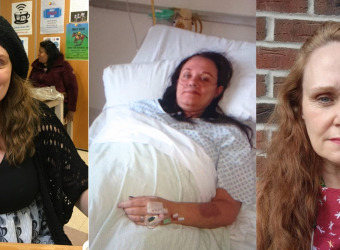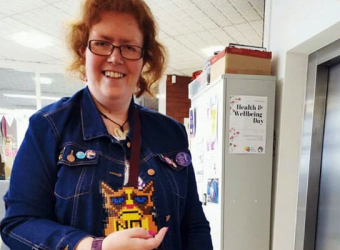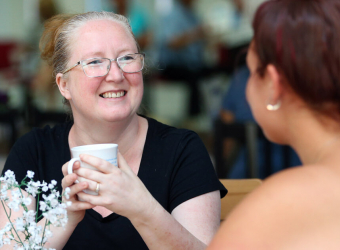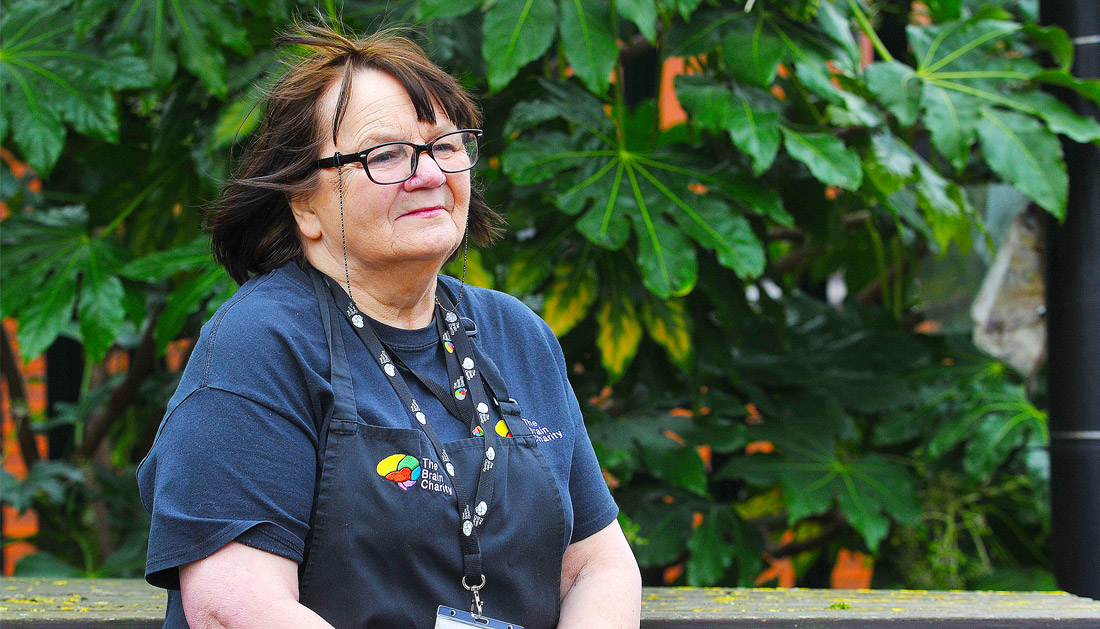
Rose’s aphasia story: “A stroke took my voice away. Singing in The Brain Charity’s choir helped me find it again”
In August 2015, Rose Griffiths, 72, experienced a stroke while she was working in Asda.
The widowed mum-of-two’s shocked colleagues called an ambulance when she collapsed to the floor unconscious, and she was rushed to hospital.
When she woke up in intensive care several days later, doctors told Rose she might never speak or walk again and she was diagnosed with aphasia, which affects 1 in 3 stroke survivors.
Before her stroke, Rose had worked in marketing as a typist and loved crosswords – so to realise she could no longer talk, read or write was deeply shocking for her.
She said: “The moment I collapsed, my whole world suddenly changed.
“When I woke up in hospital, I was paralysed down my right-hand side, and had lost the ability to walk, talk and write.
“At first I wasn’t able to communicate with the outside world at all, which was very frustrating.
“All I ever wanted to do after my stroke was to be able to speak again. Trying to speak and not being able to is such a horrible feeling.”
Rose, from Old Swan, Liverpool, was determined to regain her ability to speak, write and read.
In the next few years following her stroke, she taught herself to write again with her left hand, her mobility improved and she was able to read and write again.
But despite the early intervention speech and language therapy she had undergone in hospital, her talking was still limited.
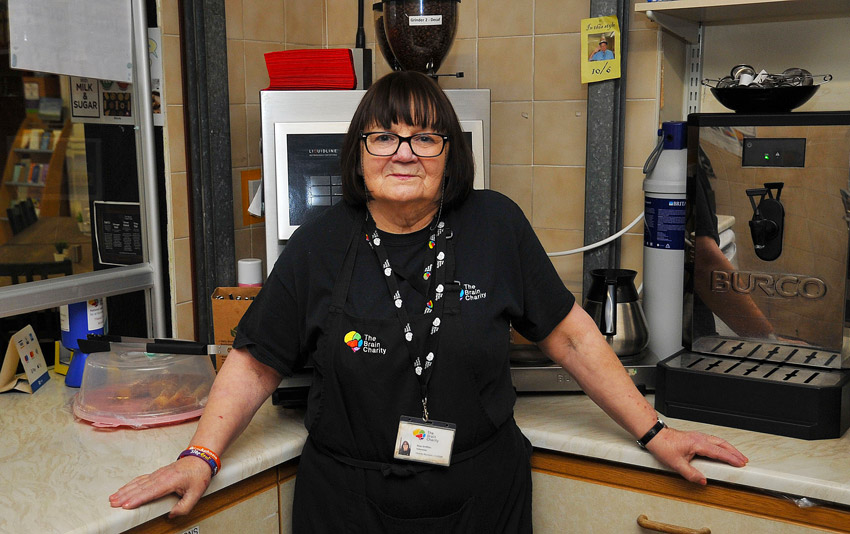
Surprisingly, when Rose’s voice did begin to return, the 72-year-old was shocked to discover her Scouse accent had been replaced.
The mum-of-two said: “At first, people said I sounded Russian. Then my accent changed to sound more German or Eastern European.
“Because of the Russian accent, sometimes I found it difficult to even understand what I was saying as I was speaking – or other times I couldn’t hear any accent, and thought I was speaking normally.
“While the accents were strange, my daughters (Lisa, 50, and Kellie, 48) were just so glad I was able to speak to them again. They were marvellous and never gave up on me.
“But it could be frustrating – one time, someone heard my Eastern European accent and asked me where I was from.
“I couldn’t believe I was having to explain that I was from Liverpool, when I’d lived there my whole life – my Scouse accent was a key part of my identity.
“I loved to chat with people, but I couldn’t do that anymore. People didn’t want to talk to me because they couldn’t understand what I was saying. I felt so lonely.
“My Scouse accent has never returned, and I don’t know if it ever will – I don’t sound the same as I used to, people think I sound more posh now.”
As well as Foreign Language Syndrome, Rose has non-fluent aphasia, which is characterised by sporadic, hesitant speech and difficulties finding and remembering the right words.
At first, she would struggle to find or say the right words out loud, and to cover up her embarrassment during conversations would laugh, which others found confusing or odd.
Sometimes, she would ‘chicken out’ of speaking all together and write things down to communicate instead.
Her struggles with speech knocked her self-confidence taking on day-to-day interactions like getting a taxi or buying something from a shop, and she felt isolated and lonely.
But after a Stroke Association advisor suggested giving singing a go, to her surprise, although speaking in full sentences was still proving difficult, Rose discovered she could sing clearly and coherently.
She joined The Brain Charity’s choir to practise her speech, and now sings with the group once a week and enjoys belting out pitch-perfect hits like True Colours at charity events.
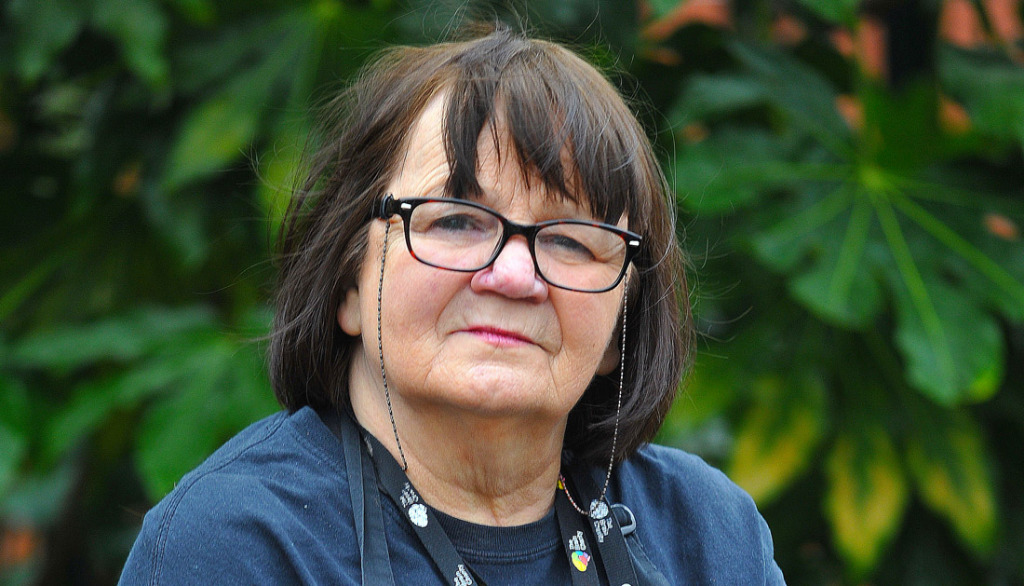
Rose said: “I was scared my speech would always be how it was when I first woke up in hospital, but I knew I wanted to get better.
“Through my own determination I had learned to walk and write again, so I knew it was possible for my speech to come back too.
“It wasn’t improving, but an advisor from the Stroke Association asked me ‘have you tried singing?’ because singing and music are controlled by a different part of your brain to speech.
“When I discovered I could still sing, even though talking was still difficult, it was incredible. It felt so powerful.
“My speech began to improve because of the singing too. Before, I’d only ever sung in the shower – now I am confident singing in front of large audiences as part of The Brain Charity’s choir.”
After the COVID-19 pandemic, Rose returned to her role as a volunteer at The Brain Food Café inside The Brain Charity’s centre, but struggled to manage conversations with visitors.
She recently underwent a programme of speech and language therapy funded by The Brain Charity, setting herself the goal of developing her confidence to communicate in full sentences.
Rose said: “Speech and language therapy was miraculous in helping my speech improve.
“Now, as I speak I can’t believe I’m talking. I never thought I’d be able to speak like this again.
“Aphasia can be incredibly frustrating, I have to remind people not to finish my sentences for me.
“But my voice is heard now – people actually listen to me, and don’t dismiss me – and that makes such a difference to my life.
“I now feel able and excited to talk to anyone, because I know people understand me. It’s like a veil has been lifted.
“I find it really important to greet people coming into The Brain Charity and try to make them feel welcome, because I know how they must be feeling.
“If other people tell me they can’t speak, I encourage them to give singing in the choir a go.
“If you have aphasia, speech and language therapy is vital in helping you find your voice.
“Having sessions privately is out of most people’s financial reach and is something I wouldn’t have been able to afford if it weren’t for The Brain Charity, it’s definitely something that should be more accessible to everyone.
“I’m so committed to raising awareness so other people understand the impact it can have.”
Categories: Social activities, Volunteering
Published: 13 April 2022




